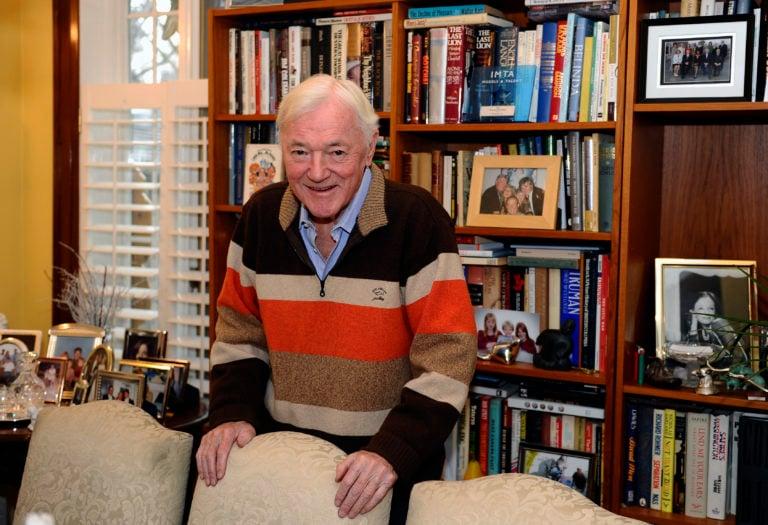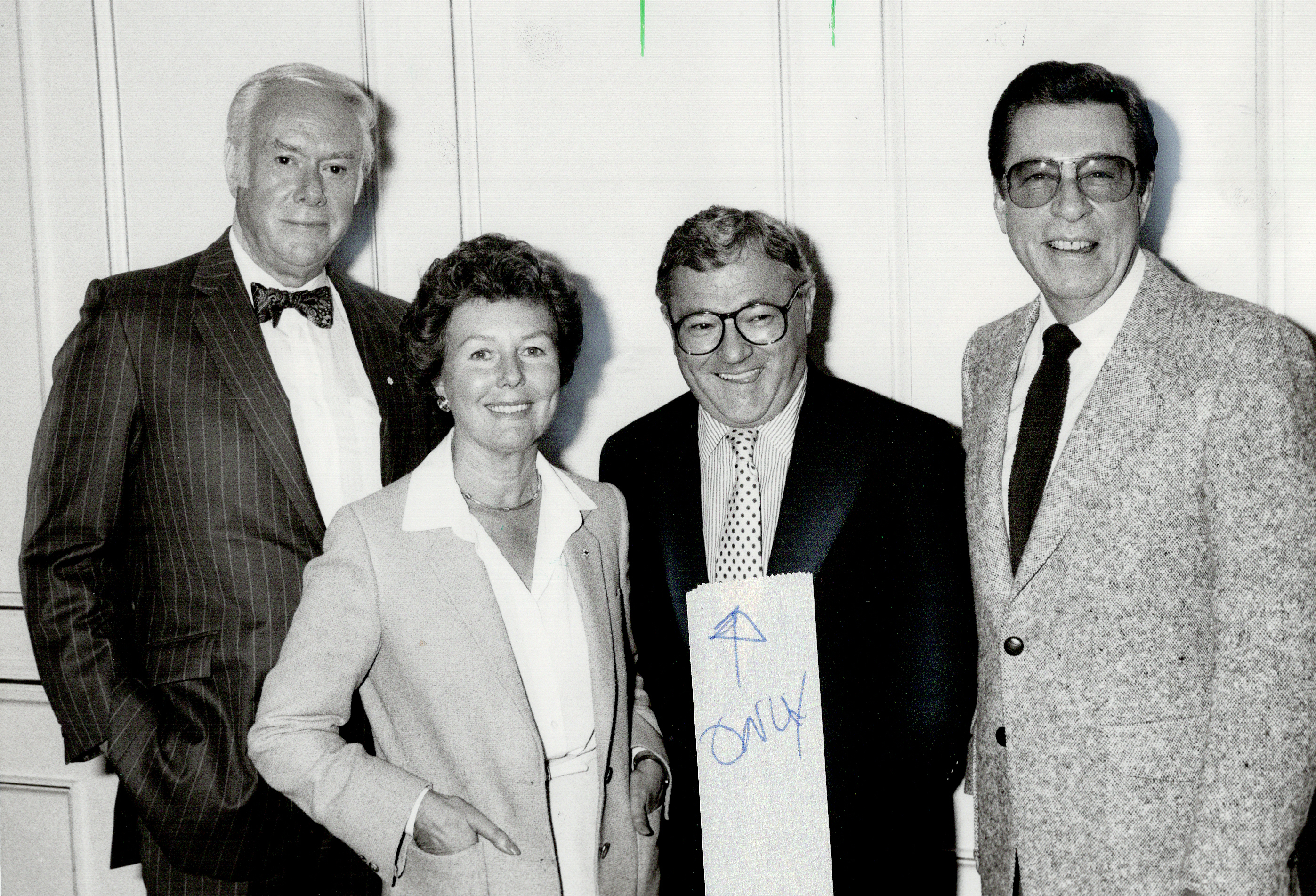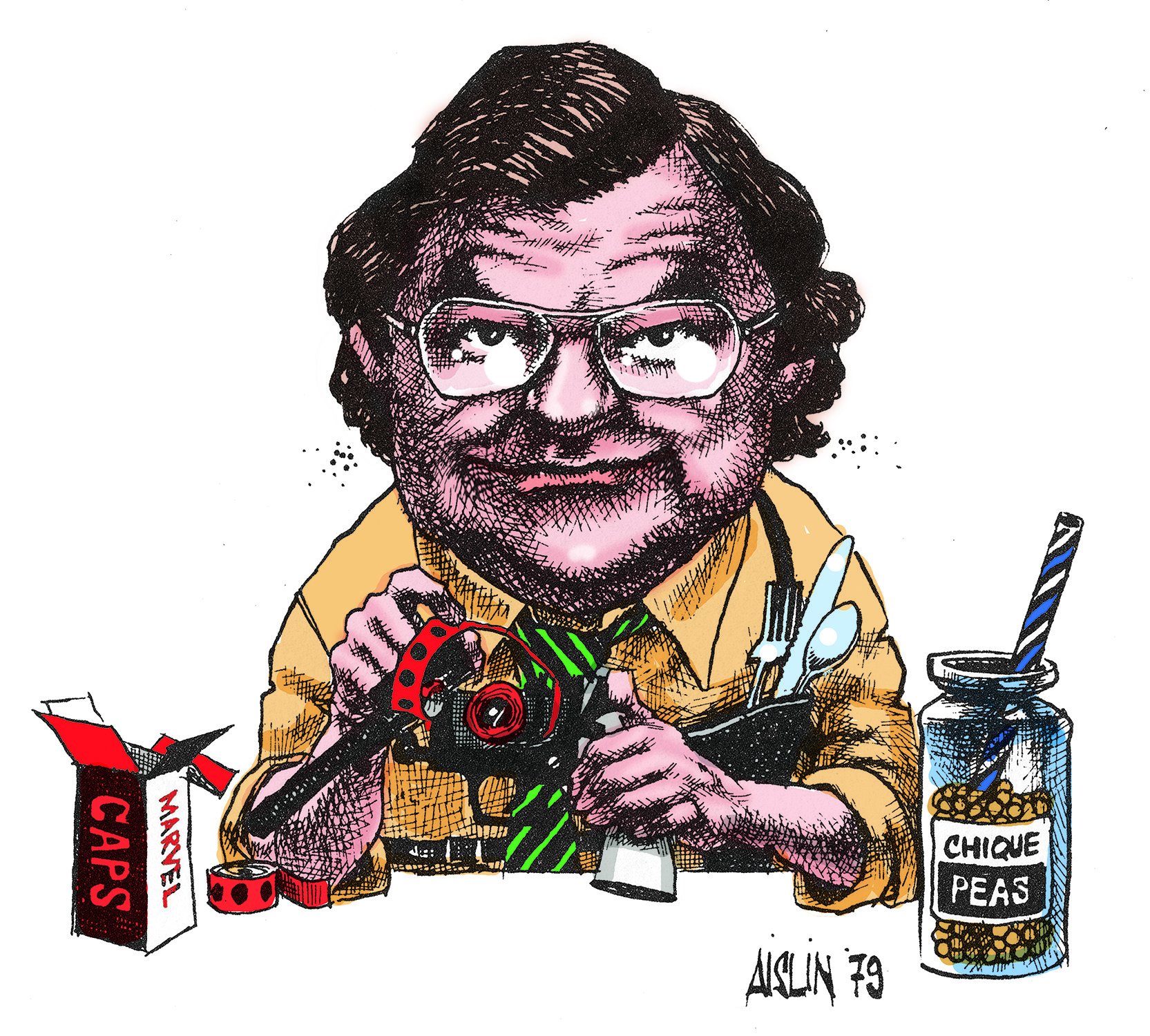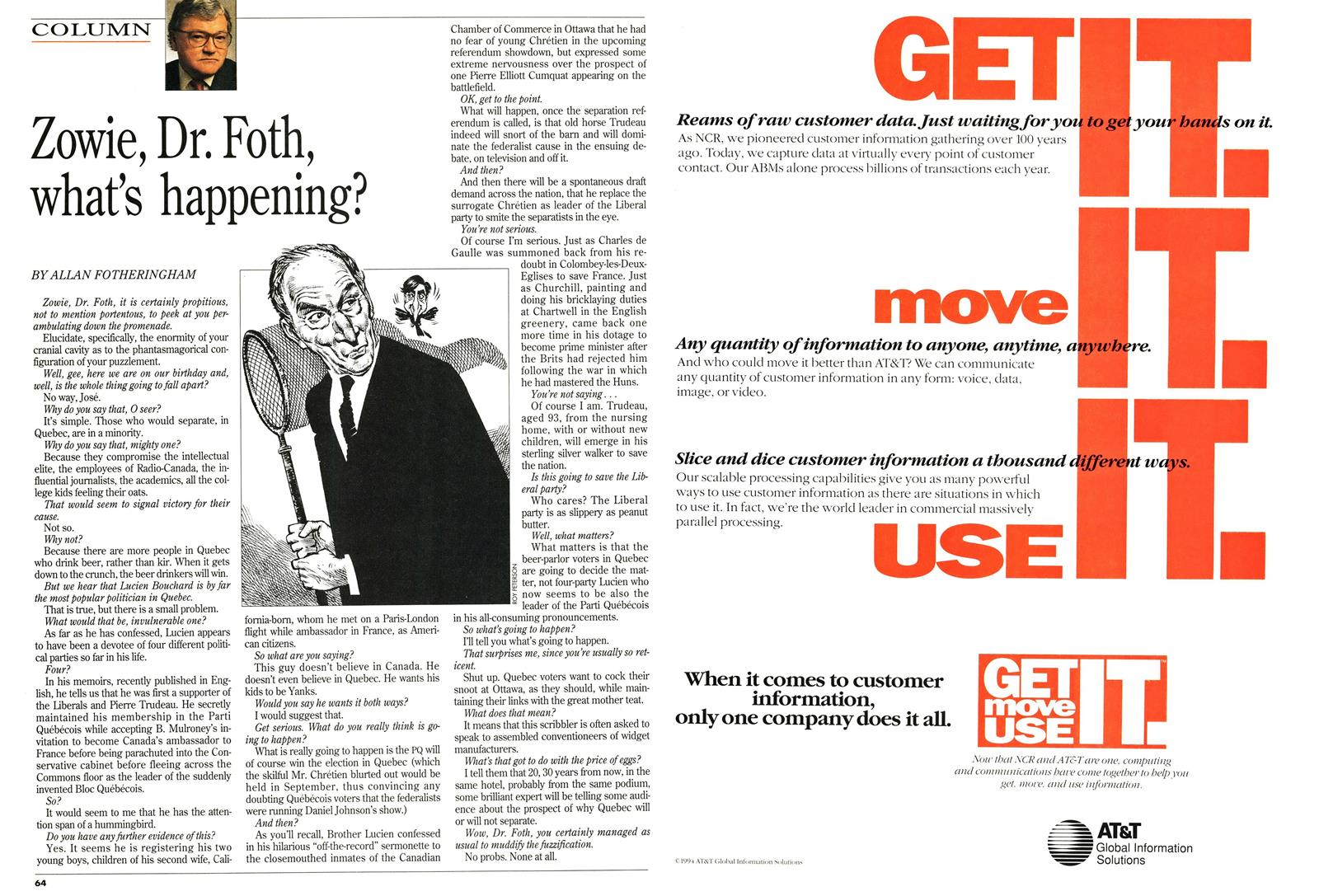Allan Fotheringham was loved, revered and loathed but never ignored
The Maclean’s icon who shook Canadian politics and media with a blast of post-’60s insouciance has died. He defined acerbic wit, but couldn’t hide how deeply he cared about his country.

Fotheringham at home in 2011. (Colin McConnell/Toronto Star via Getty Images)
Share
Allan Fotheringham was the king of nicknames. He fancied himself Dr. Foth, or the Great Gatheringfroth, but mostly he bestowed monikers upon others. The Glasgow-born broadcaster Jack Webster, a friend, was The Oatmeal Savage. Joe Clark was Jurassic Clark. Vancouver mayor Art Phillips became Mayor Phlip-Phlop. Replacing the last letter of an odd first name with a punctuation mark rendered Preston Manning as Presto!
The Liberals (or Gliberals) were the Natural Governing Party, triumphing over the Regressive Convertibles and the Few Democrats. The Prime Minister’s official residence became “24 Nosex Drive,” which was in Ottawa, also known as Coma City, or “Ennui-on-the-Rideau,” or “Sparta on the Tundra,” or “yesterday’s city tomorrow,” or “bland on the outside, comatose on the inside.” If possible, Fotheringham was less kind about Toronto.
For 27 years, he tilled the best-known piece of real estate in Canadian magazines with a cheeky column on the final editorial page of every issue of Maclean’s. The feature, illustrated by the great Vancouver cartoonist Roy Peterson, was so popular with this magazine’s readership that many read the publication from back to front. Fotheringham titled a collection of those columns as “Last Page First.”
Readers expected not so much insight, or exposé, as entertaining, if sometimes tawdry, insults. Jurassic Clark booked a hall “that sleeps 300.” Brian Mulroney was “the Jaw that walks like a man.” A fellow columnist who never turned down the chance for a free meal was “the fastest fork in the West.” The used-car salesman wardrobe of white tie, white belt and white shoes became “the full Nanaimo.” The CBC was the Holy Mother Corp, or Canadian Broadcorping Castration, while Alberta premier Ralph Klein was “a former TV reporter who resembles a badly-dressed bowling ball.” The oil barons of Calgary were the “blue-eyed sheiks of Saudi Alberta.”
At his best, he huffed a great gust of post-’60s irreverence, offering a blast of insouciance aimed at the pompous denizens of Parliament and the ink-stained courtiers of the Press Gallery who delivered ponderous pronouncements in galleys of grey ink.
With a pen as sharp as a stiletto, Fotheringham slashed his way into the national conversation at a time when the country’s fate seemed everywhere at risk. Those events can now be recalled in shorthand—the first Quebec independence referendum, the repatriation of the Constitution, the free-trade debates, Meech Lake, Charlottetown, a second Quebec referendum, and on and on. Through it all, Fotheringham’s back-page column was a must-read destination for Canadians, making him loved and loathed but rarely ignored. Even if you missed out on a column, you would hear the funniest lines repeated at your next barbecue, dinner party, or family gathering. He was the best-known pundit in the land. And for all the cheap jabs and wiseacre put-downs, Fotheringham could not hide that he cared deeply about this crazy, impractical experiment of a country.
PAUL WELLS: Unlocking the mystery of Dr. Foth
As a physical specimen, Fotheringham was a bantam rooster, “a short, wild egomaniac,” in his own words. He was a soft-featured man with no neck whose physique gave little hint of the competitive sprinter he had been in his youth. Away from the keyboard, he was a gadabout who enjoyed alcohol and fine food in the company of women and an expense account. At his peak (not necessarily of creativity, but of income), he wrote the back-page column for Maclean’s, as well as a syndicated newspaper column, recycled both into books, and tramped the lecture circuit repeating what was in the books, while also appearing on television’s Front Page Challenge, each of these gigs providing an expense account whose upper limits were likely to be tested.
Bon mots financed life as a bon vivant. He dressed like a dandy, wearing contrast collar dress shirts and fine suits with pocket handkerchiefs and cufflinks, sometimes even dressing all in white like a northern Tom Wolfe. Fotheringham came across as a scamp, a rapscallion, a choirboy sneaking sips from the sacramental wine.
The columnist was promoted as “the wicked wit of the West” and as “the greatest cobweb blower and guff remover in Canadian journalism.” If you did not care for the wit of this master of invective, or were one of his many targets, you might think he put the ass into acerbic. The journalist Bruce Hutchison, a generation older, described Fotheringham as a “gadfly and frumious Bandersnatch of Pacific Coast Journalism.” The writer Scott Symons informed Globe and Mail readers he considered Fotheringham to be “some kind of journalistic Little Lord Fauntleroy posing as Gore Vidal.”
Many profiles over the years acknowledged his irascibility even as they complained he remained unknowable. Fotheringham’s pugnaciousness and willingness to deflate the egos of the powerful reflected his own self-identification as “a struggling boy from the gopher holes.” He held an outsider’s resentment against those accustomed to wealth and power as a birthright. He never hid his motivation, which is right there in the title of his final book, the 2011 autobiography Boy from Nowhere.
The opening sentences read: “I never knew my father. He died when I was two.” John James Scott, a 31-year-old general merchant in the Saskatchewan hamlet of Hearne, died in hospital in Moose Jaw of appendicitis. His widow, six years younger, was left with four children under the age of five. On the Prairies. In the depths of the Depression. One of her famous son’s earliest memories is helping her tack sheets to the windows of their dust-bowl farm in a futile effort to keep dirt from blowing in.

The boy’s birth, on Aug. 31, 1932, was an adventure of its own. His mother, the former Edna Mae Clarke, was the third of 11 children born to a local farm family. Fotheringham’s birth was part of family lore. When his mother went into labour, it was decided three brothers would drive her by truck to the nearest hospital down the road in Rouleau. As it turned out, months of drought ended that day.
“It was dry as a bone. The ground was like icing sugar,” Fotheringham wrote. “When it finally did rain, it was like chocolate fudge. They called it ‘gumbo mud.’”
ROBERT LEWIS: The life and bravado of Allan Fotheringham
The truck slid off the road either three times (according to his newspaper column), or four times (according to his autobiography), his mother moaning on the rear bench as the brothers pushed the truck back onto the road, their exertions eased by sharing a pint of rye. In the midst of this chaos, the sky went dark from a solar eclipse. The uncles jokingly were disappointed to learn the boy had been named Allan when they had been lobbying for Gumbo Eclipse.
Hearne, about 75 kilometres southwest of Regina, was so isolated and small “it couldn’t afford a village idiot,” Fotheringham wrote (more than once). “Everyone had to take turns.” He insisted residents were known as Hearnias. (His birthplace of Rouleau later gained some renown as the fictional Dog River, the setting for the countrified sitcom “Corner Gas.”)
In 1940, his mother married Cpl. Douglas Fotheringham, an army paymaster, in the manse of the United Church in nearby Avonlea. The family moved to Regina (“like going from Kansas to Manhattan”) leaving behind the one-room country schoolhouse in which the boy began his education, before the family started anew in Sardis, a town now part of Chilliwack, in British Columbia’s fertile Fraser Valley.

Fotheringham claimed to have worked as a young man as a steelworker, as a tree faller (for two days; he did not recoup the $50 he invested in loggers’ caulk boots), and as a spreader of frozen peas in a food-processing factory. It was hard to imagine those soft hands lifting anything heavier than a martini glass, or to have pounded anything more mechanical than a typewriter key.
Having shown some writing chops by contributing a high-school column to the weekly Chilliwack Progress, Fotheringham made it his ambition to join the student newspaper at the University of British Columbia. The Ubyssey was the journalistic training ground for the likes of Pierre Berton, Eric Nicol, and Lister Sinclair.
Even as a student, he showed a talent for finding an opponent’s weakness. In his Campus Chaff column, he taunted engineering students for their lack of romantic success with a gender not to be found in their classrooms. Their predictable response was to kidnap the editor. In October 1952 Fotheringham was grabbed and chained to a streetlight beneath the famous Birks Clock at Vancouver’s main downtown intersection. He was later kidnapped a second time and dropped off in the woods of West Vancouver from which he had a long walk home. He plotted his revenge for years before nabbing the president of the engineers’ graduating class and holding him in a cottage during which he missed a traditional, three-day, end-of-studies bacchanal.
Fotheringham, who succeeded Joe Schlesinger as editor of the campus newspaper, knew top Ubyssey staffers got hired by the downtown dailies. Fotheringham was a part-time sports reporter for the Vancouver Sun when he helped produce a student parody in the Ubyssey mocking his humourless boss, Erwin Swangard, as Squirming S. Vangard. Swangard threatened to sue for libel and for a time Fotheringham’s future at the paper was in doubt.
By the late 1950s, he was writing a travel column called “The Magic Carpet.” In 1964, he won a Southam Newspaper Fellowship. Four years later, the Sun made him a columnist and Fotheringham’s take-no-prisoners approach made him as indelibly associated with the emerging liberal Vancouver as Mike Royko was to Chicago and Jimmy Breslin to New York. The city column became a national column for FP Publications, then Southam News, the Financial Post, Sun Media, and, in the midst of a turn-of-the-century Toronto newspaper war, the Globe and Mail.
When this magazine transitioned from a monthly into a go-get-’em newsweekly under editor Peter C. Newman in the fall of 1975, Fotheringham was one of the key hires. His debut on Oct. 6, 1975, was forgettable, a description of the seven-year-old Pierre Trudeau government as being tired and out-of-touch. But in time, he found his rhythm and his audience.
For all the bluster, Fotheringham was often at his best when touched by those who expressed their pride in the country without cynicism. He was a romantic in that way. As Quebec voted on sovereignty in 1995, the outcome very much in doubt and Confederation hanging in the balance, Fotheringham noted a disturbance on the floor of the House of Commons.
“In the back row of the Liberal benches,” he wrote, “MP Pierrette Ringuette-Maltais stood and burst into the opening strains of O Canada. Those in front of her struggled to their feet and attempted to follow. So did the Reform MPs, all gazing at the vast expanse of seats abandoned for the day by the Bloc Québécois, supposedly Her Majesty’s Loyal Opposition.
“They attempted to follow her lead in the words most of them couldn’t remember but, like one of those imported singers hired to sing the national anthem at the World Series, her soaring, beautiful voice almost drowned out them all and reverberated throughout the chamber. She sang it all in French.”
Over the years, it must be said, his columns, for this publication and others, came to be less original and more recycled, Fotheringham a one-man Golden Oldies band playing the hits (Lotusland, Tweed Curtain, Excited States of America) for an audience expecting and finding comfort in the familiar Fothisms (as he called them).

Then there were the libel suits. Many threatened to sue; few went to court. Fotheringham faced 26 libel writs by his count, losing two notable cases for columns published in Maclean’s. In 1984, he offhandedly described two up-and-coming Vancouver lawyers as “cementing their connections through the tennis club circuits and the wife-swapping brigades.” Foth told the court he was merely being acerbic, as was his style. He even wrote an apology (the wording of which the businessmen’s lawyer later described to court as being sneaky, sleazy and malicious), and the magazine published a second apology six weeks before the defamation case came to court. The lawyers were awarded $20,000 plus court costs.
In 1988, Fotheringham wrote that the English explorer Sir Ranulph Twisleton-Wykeham-Fiennes had never achieved anything of scientific or historical worth. Sir Ranulph sued in the Royal Courts of London (Maclean’s having sold some 400 copies of the issue in Britain out of a circulation of 600,000). It took a jury just 40 minutes to set the award. The columnist and his magazine co-defendants were ordered to pay £100,000 (about $208,000 Cdn) to the explorer for libel, as well as £75,000 ($156,000 Cdn) in legal costs.
There were honours, too. He once defeated himself for a National Magazine Award for humour, winning both a gold medal and an honourable mention in 1979. He also won a National Newspaper Award as best columnist in 1983. He was inducted into the Canadian News Hall of Fame in 1999. Three years later, he was presented the Bruce Hutchison Lifetime Achievement Award by the Jack Webster Foundation, the latter named for the late Oatmeal Savage (aka Haggis McBagpipe).
His nine books were mostly light entertainments, rehashing daily and weekly material, though in Malice in Blunderland he produced a memorable epigram: “In the Maritimes, politics is a disease; in Quebec a religion; in Ontario a business; on the Prairies a protest; and in British Columbia an entertainment.”
His own standards for victory were to be found in his claim of having visited 91 countries “on someone else’s money.” One year, he noted proudly in Boy from Nowhere, his tax return declared an income of $492,000. That would buy a lot of gopher holes in his native province.
Murray Allan (né Scott) Fotheringham, an acerbic son of the prairie soil, died on Wednesday. He was 87.